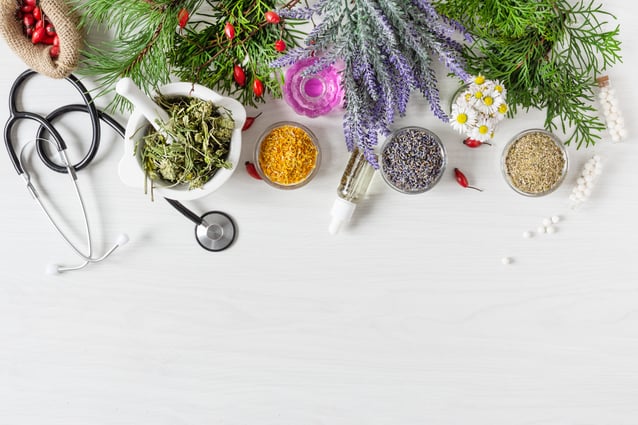
KP Khalsa is one of North America's foremost experts on holistic medicine and Ayurveda, and he recently spoke with team members at Portland Community College's Integrative Healthcare program. His programming offers rigorous learning for those interested in a holistic approach to complement the use of herbs for treating bodies and minds.
KP Khalsa says studying Ayurveda and its herbal remedy system in his youth was a significant part of his ability to overcome a degenerative disease and live much longer than his projected life expectancy at the time. Since then, he's pursued the study of Ayurveda intensively and enjoys sharing his expertise with his students.
What is the Role of Herbs in Ayurveda?
At first, it might be easy to see herbal remedies in Ayurveda as similar to analogs in Western medicine, from pills to vitamin capsules. However, herbs have a distinct role in Ayurveda, and the attitudes involved are also different. Studying with an Ayurvedic healer or teacher can help you see how your diagnosis and treatment and your mentality may need to change.
For instance, KP rejects the idea that medicine and food are different; "when we're talking about healing substances, whatever you take into your body, medicine or food, are both on the same spectrum," he explains.
Herbal tonics and formulas in Ayurveda are almost always going to appear in more significant "doses" when compared to Western pills and capsules. It's because they are less concentrated and potent. KP mentions how many herbs are slow-acting, general healing herbs, which can be taken in milk or as a tea, but which you take every day for the rest of your life instead of as a one-and-done remedy to a specific symptom.
"In Ayurveda," he says. "we don't treat the symptom, but we rather try to understand why there is a symptom in the first place and work from there."
In the Herbalism course at Portland Community College, students learn how herbs factor into the Ayurvedic understanding of the body and its ailments, providing a complete sense of why an Ayurvedic teacher or healer would suggest particular herbal remedies.
The Herbs and Their Benefits
KP Khalsa says examples of fundamental herbs that are likely to be prescribed for their more general health benefits include Ashwagandha for men or those experiencing anxiety, and Shatavari for balancing hormones over time. He also mentions that Gotu Kola, Turmeric, and Triphala are all commonly suggested for a wide variety of ongoing ailments and preventative benefits.
He discusses how many other herbs can be used in high doses for acute symptoms and then scaled back to a steady amount that is preventative. He outlines how herbs can be mixed, cooked into food, or steeped in oil. It is used topically depending on how it reacts to both oil and water and to the body. Ayurvedic healers share the long-time understanding of each herb and formula for the next generation of healers to aid people interested in holistic and traditional medicines.
"We all stand on the shoulders of giants; if our ancestors hadn't been working on this stuff for 5,000 years, we wouldn't have what we have; it's due to the grace of their teaching," says KP Khalsa.
Surprises in Store as You Pursue Herbalism
One of the unique elements of studying herbalism is learning that there are healing properties to substances that our culture already uses, often without knowing about them. Black pepper and dry ginger, for instance, are considered very good for digestion, even though they are also excellent flavorings for food.
"Make every meal an opportunity to have a healing experience!" says Khalsa.
He also mentions that people often ask him if there are significant differences between Chinese medicine and Ayurveda. While there are some distinctions, such as Ayurveda's use of milk products and oils and Chinese medicine usually not preferring those items, he points out that they have both led to many similar discoveries. "They are 90% identical under the surface," he says.
More so than ever before, Khalsa recommends learning about and taking herbs because of how diets and environments have changed. He urges people not to wait until they've mistreated their bodies through foods for many decades; instead, start using safe, healthy herbs now in food and tonics under the suggestions of an herbalist, while also making wise choices about one's diet.
Want to learn more from KP Khalsa's 45+ years of herbalism experience and from the many skilled herbalists who have studied under him? Consider taking the online Herbalism class through the Integrative Healthcare program!



